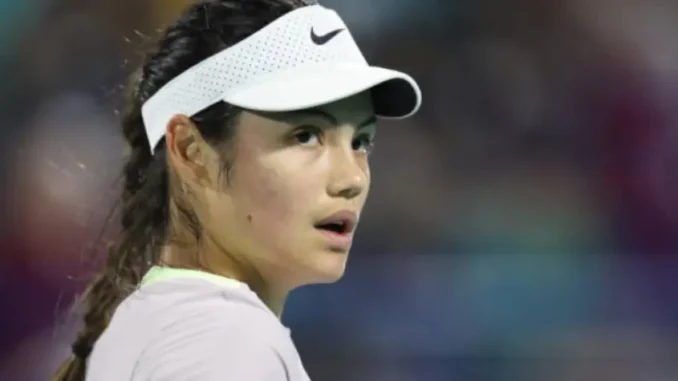
In the electric atmosphere of Beijing’s National Tennis Center, Emma Raducanu stepped onto the court for her long-awaited debut at the China Open, carrying not just her racket but a deep personal connection to the land. The 22-year-old British sensation, seeded 30th and ranked world No. 31, faced a stern test in unseeded Spaniard Cristina Bucsa, but emerged victorious in straight sets, 6-3, 6-3. The win, which lasted one hour and 37 minutes, wasn’t just another notch on her belt—it marked a triumphant return to her maternal roots and a resilient bounce-back after a heartbreaking exit the previous week.
Raducanu’s journey to this moment has been anything but straightforward. Just seven days earlier, at the Korea Open, she had squandered three match points in a gripping quarterfinal loss to Barbora Krejcikova, a defeat that left her questioning her edge under pressure. Yet, here in Beijing, under the watchful eyes of her mother Renee Zhai—who made a rare courtside appearance—the young star channeled that frustration into focus. Zhai, whose Chinese heritage has always been a quiet pillar in Raducanu’s life, sat poised in the stands, her presence a subtle reminder of the cultural threads weaving through her daughter’s story. Born in Toronto to a Chinese mother and Romanian father before moving to England at age two, Raducanu grew up bilingual in English and Mandarin, with Romanian sprinkled in from family visits. This multicultural tapestry has shaped her not only as a player but as a global ambassador for the sport, and on this crisp autumn evening, it shone brighter than ever.
The match itself was a masterclass in mental fortitude, laced with moments of sheer athletic poetry. Bucsa, no pushover at world No. 62, came out firing, unleashing 28 winners to Raducanu’s more measured 16. The Spaniard peppered the baseline with aggressive groundstrokes, forcing Raducanu into early defense. The first set alone saw Bucsa carve out six break-point opportunities, four of them crammed into the opening game alone, as if testing the Briton’s resolve right from the baseline. Raducanu, however, stood tall, saving seven of eight break points across the match with a mix of laser-like serves and instinctive net rushes. Her five aces—delivered with that signature whip-like spin—punctuated key holds, while she converted 71% of her first-serve points and scooped up 50% on her second deliveries. A pivotal surge came midway through the opener: from 3-3, Raducanu reeled off five straight games, breaking Bucsa’s rhythm and seizing control. The second set mirrored this tenacity; after Bucsa clawed back to 2-2 following a missed chance for Raducanu to go 3-0 up, the Briton broke straight back and claimed four of the final five games, sealing the deal with a forehand winner that kissed the line.
Post-match, as the crowd’s applause swelled, Raducanu’s on-court interview became a highlight reel of its own. Starting in English, she reflected on the battle with characteristic humility: “Cristina was playing amazing… so I’m very happy to have gotten over it.” But it was her pivot to Mandarin that sent ripples of shock and delight through the stands. Addressing the Beijing faithful directly, she declared, “I’m going to do my best, I really want to do well here. I’m half-Chinese, so it’s great to come back here.” The arena erupted—gasps of surprise morphing into thunderous cheers—as fans, many waving flags in a nod to her heritage, realized they were witnessing more than a tennis prodigy; they were seeing a bridge between worlds. This wasn’t performative; it was personal. Raducanu’s Mandarin fluency, honed from childhood conversations with her mother, transformed a standard post-match chat into a cultural moment, endearing her further to a tournament that feels like unfinished family business.
This victory extends a remarkable streak: Raducanu has now won her opening match at 14 consecutive tournaments, a testament to her consistency amid the whirlwind of professional demands. Earlier this year, she flipped a head-to-head script against Bucsa, dropping their first encounter in Singapore before prevailing in their next two clashes. Against players outside the top 50, she’s an imposing 14-3 in 2025, blending tactical smarts with raw power. Yet, for all her accolades—the 2021 US Open triumph as an 18-year-old qualifier, the whispers of prodigy status—Raducanu has navigated injuries, coaching changes, and the weight of expectations with a quiet maturity. Beijing represents more than points on the board; it’s a chance to honor her mother’s side of the family, to play in a city that pulses with echoes of her ancestry.
As the dust settled on her debut, Raducanu’s gaze turned forward, her motivation palpable. “After a tough one last week, to come back and bounce back—I’m very happy,” she added, her words laced with the fire of someone hungry for more. That hunger now points squarely at the third round, where she faces a formidable hurdle: American No. 4 seed Jessica Pegula. The pair have met three times before, with Pegula holding a 2-1 edge, their last clash a gritty three-setter in 2022. Pegula, a baseline bulldog with a serve that bites and a return game that neutralizes power, will test Raducanu’s all-court versatility. But if Beijing has taught us anything, it’s that Raducanu thrives when the stakes feel personal. With her mother in the stands and a half-nation’s hopes subtly aligned, expect her to summon that same blend of grit and grace.
Meanwhile, British tennis is buzzing with parallel success: compatriot Sonay Kartal powered into the third round with a commanding straight-sets win over former top-10 player Daria Kasatkina, 6-4, 6-2. Kartal’s rise—fueled by a breakout summer that included a WTA 125 title—adds to the narrative of a resurgent UK contingent in Asia. For Raducanu, though, this is her stage. In a tournament that marries high-stakes competition with heartfelt homecoming, her words ring true: she really wants to do well here. And if her debut is any indication, Beijing might just witness the next chapter in a career that’s far from written.
Leave a Reply